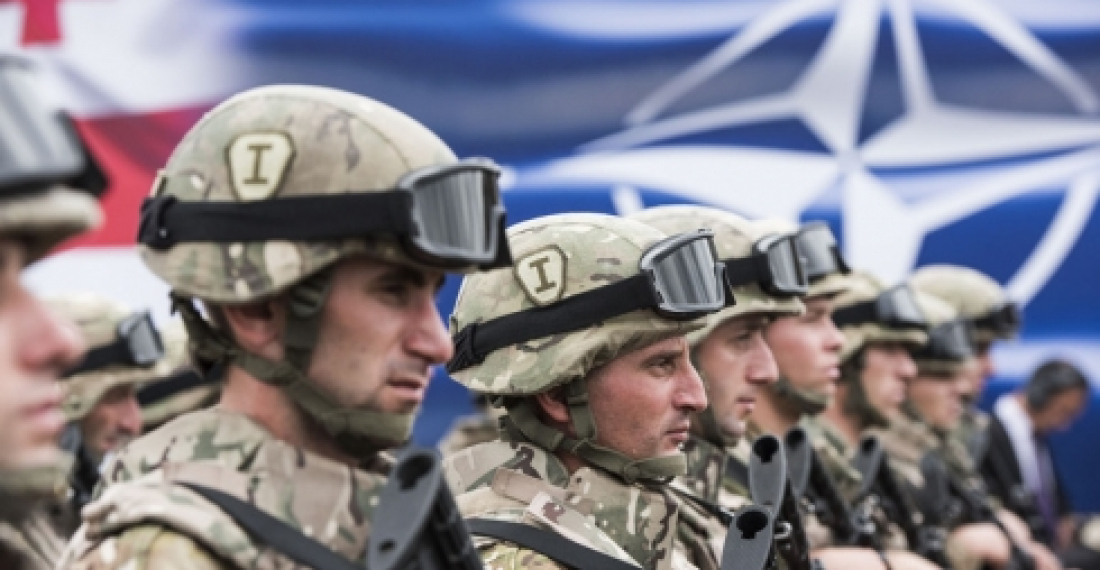Last week, NATO's Secretary General Jens Stotlenberg made his first official visit to Georgia during which he inaugurated a new NATO Training Centre close to the capital, Tbilisi.
At a joint press conference with President Giorgi Margvelashvili, Mr. Stoltenberg described Georgia as "a strong and reliable contributor to our shared security". He thanked Georgia for its commitment to its relationship with the Alliance - "a relationship that is getting closer and deeper" - and for being the second largest contributor to NATO's Resolute Support mission in Afghanistan.
Welcoming Georgia's impressive democratic reforms, Mr. Stoltenberg called the country "an example in the region and beyond", saying its efforts demonstrate "commitment to being part of the Euro-Atlantic family" and help Georgia prepare for NATO membership. He said he looked forward to continued progress, saying "Euro-Atlantic integration is not an easy road; it takes time, determined efforts and real change." He stressed, "NATO will continue to stand by Georgia."
The Secretary General also condemned Russia's ongoing interference in Georgia, saying "Russia's latest actions to move the administrative boundary line of the South Ossetia region of Georgia are yet another breach of Russia's international commitments." He stressed that NATO Allies remain "fully committed" to Georgia's territorial integrity within its internationally recognised borders.
Together with President Margvelashvili, Prime Minister Irakli Garibashvili, Foreign Minister Tamar Beruchashvili and Defence Minister Tinatin Khidasheli, the Secretary General opened the new NATO-Georgia Joint Training and Evaluation Centre at the Krtsanisi Military Facility, where Georgian troops will train alongside Allies and partners. Calling the inauguration "an important moment step forward", Mr. Stoltenberg stressed "it is not directed against anybody; on the contrary, the centre will be important to improve regional and international stability." He noted that "Georgian forces will grow more interoperable with NATO. NATO will be more present, and more visible in Georgia. And Georgia's commitment to international peace and security will grow even more."
"There is more Georgia in NATO and more NATO in Georgia," he said. "And all these efforts help Georgia move closer to your aspiration of NATO membership".
According to the press service of NATO the Training Centre is part of the Substantial NATO-Georgia Package, agreed at the Wales Summit last year to help Georgia in its aspirations to NATO membership. NATO-Georgia cooperation over many years has strengthened Georgia's forces, allowing them to work with Allies more closely than ever before.
The Secretary General also held talks with Prime Minister Irakli Garibashvili, Foreign Minister Tamar Beruchashvili, Defence Minister Tinatin Khidasheli, the Speaker of the Georgian Parliament, David Usupashvili, and other parliamentary leaders. Earlier on Thursday, the Secretary General laid a wreath at the Memorial of Heroes Square.
Russia describes the opening of the centre as a provocation
Russia described the opening of NATO's training center in Georgia as "another move to continue the alliance's provocative policies to expand geo-political influence". Russian Foreign Ministry spokesperson Maria Zakharova said on Thursday "We regard this step as continuation of the alliance's provocative policies to expand its geopolitical influence by using the resources of the alliance's partner states. The deployment of such a facility in Georgia is a major destabilizing factor for security in the region"
Zakharova added, "Those who in this situation keep pulling Tbilisi into NATO should be aware of the degree of their responsibility," Zakharova said."As far as Russia is concerned, it will continue to comply with the international liabilities to provide reliable protection for its allies - the republics of South Ossetia and Abkhazia," she added. "It will also take note of all new developments in NATO-Georgia cooperation."
It is now no longer a question of "if" Georgia will join NATO, It is simply a question of "when".
Commonspace.eu political editor said in a comment that the opening of the NATO centre in Tbilisi "breaks once and for all a false taboo about Russian monopoly in the South Caucasus. Ever since the collapse of the USSR Russia has insisted that it should have a veto on all issues related to military and security matters in the region. Countries such as Georgia who have tried to move forward with an independent foreign policy have been put under considerable pressure, and worse. Russia has gone to great lengths to ensure that none of the former Soviet Republics, except for the Baltic States, join NATO. For a moment it seemed that NATO member states were willing to accomodate Russian demands. Through its actions in Ukraine over the last two years Russia has however exhausted the goodwill of western countries. Its actions in Georgia, including the recent attempts to change the boundary between Georgia and the separatist territory of South Ossetia is the latest example of Russia's bad intentions. Most NATO governments as a result care much less about Russian sensibilities than they did only two years ago, and are no longer willing to accept that Russia has a right to any kind of monopoly or veto in the region. It is true that the training centre in Krtsanisi is a modest affair. It has no military capability as such. It is not part of a plan against Russia or against anybody else. However it does change the reality of the situation in one significant way. It is now no longer a question of 'if' Georgia will join NATO, It is simply a question of 'when'. That much now even Moscow seems to have understood."
source; commonspace.eu with additional reporting from the Tass news agency and the website of NATO
picture: Georgian soldiers on parade during the opening ceremony of the new NATO tarining centre in Georgia on 27 August 2015. (Picture courtesy of the NATO information service).







